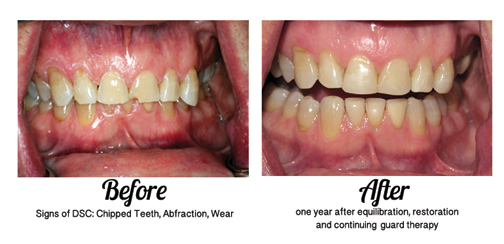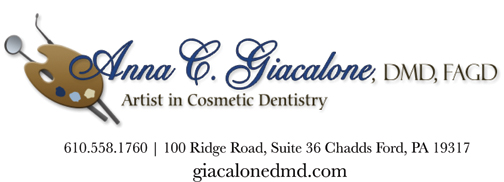Dental Compression Syndrome: More Than A Cosmetic Problem

By Anna Giacalone, D.M.D.
Dental Compression Syndrome (DSC) is a contemporary name for the habit of clenching and grinding one’s teeth. The forces of clenching and grinding are significant and according to a leading researcher can easily exceed 500 lbs. per square inch! This force simultaneously applies pressure to the teeth, the bone supporting the teeth, and the temporomandibular joint (TMJ) where the lower jaw hinges against the skull. These heavy repetitive load applications can cause headaches, facial pain, neck and shoulder pain, loss of bone supporting the teeth, sensitive teeth, fractured teeth, ringing in the ears, and problems concerning the TMJ.
Although some authors estimate as much as 90% of the population exhibits damage from DSC, a much smaller percentage are aware of the habit. This underscores the importance of the comprehensive dental exam in which the dentist may observe one or more of the unmistakable signs of DCS.
Enlarged muscles on the sides of the face
Recession of the gums with or without the notching known as abfraction
Flattening of the canines and posterior teeth
Short front teeth
Perfectly formed polished dimples on the biting surfaces of posterior teeth
Excessive knuckle-like bone around the necks of the teeth
Changes in the TMJ structure
Fractured or loose teeth
It is important to identify the causes of DCS so that these factors may be modified to the greatest extent possible. The most common cause of DCS is life stress. Other causes include: lifting weights, sleep disorders, neuromuscular diseases, chronic pain, stimulant medications, bite (occlusal) pathology
The dental etiology merits some explanation. When the jaw sits properly in the housing of the skull, all teeth should meet equally. In this position the elevator muscles which allow the jaw to close shut off, rest. This period of rest allows for comfortable neuromusculature. In addition when the mouth is open and/or the jaw moves to the side as it does when grinding, the back teeth should not bang into one another. These “interferences” to lateral movement set up reflex contraction of the muscles. The contraction of the elevator muscles is meant to protect us from damaging our teeth when unexpectantly encountering a hard object. The problem is that the frequent contraction of the opening muscles cause muscle spasms, facial pain and headaches.
The treatment for DCS is four fold; Education, Equilibration, Restorative dentistry and Guard therapy/prevention
Equilibration is the recontouring of teeth by reshaping. The goal of this “recontouring” is to make all teeth touch equally when the jaw is in a harmonious relationship to the skull. This position allows the muscles to rest when intentional functioning is not required. The equilibration process is painless and only a minute amount of enamel is removed.
Restorative dentistry is required when there is damage to the teeth by DCS, such as fracture, abfraction, chipping, significant wear. The goal is to restore esthetics as well as function and comfort.
Obviously all causes of DCS are not easily controlled. We certainly should try to limit stress as it would benefit our health and well being, but realistically we live in a fast paced stressful world. The need for dental appliances to achieve harmony between teeth and muscles and prevent future wear is a reality for most of us.
Dental Compression Syndrome is important to diagnose and treat so that healthy, comfortable and beautiful teeth last a lifetime.
What patients are saying about us:
“Have had significant dental and cosmetic work done by Dr. G. and she truly is an artist. Excellent skills, combined with a personable, focused, and caring manner will keep us using Dr. G. for a long, long, time.” – Tiffany V.
“I have been going to Dr. Giacalone for over 21 yrs. and I could not be happier with the service over the years. You always feel like a valued patient and treated very professionally,” – George C.
Anna C. Giacalone, DMD, MAGD
Master of the Academy of General Dentistry
Education:
• BS. Biology Chestnut Hill College
• DMD. University of Pennsylvania School of Dental Medicine
• Certificate and Internship: Comprehensive Orthodontic Institute
• Certificate: prestigious Dawson Academy of Advanced Study
Awards:
• Pennsylvania Dental Association Award for Excellence during the four years of dental school
• Top Cosmetic Dentist Main Line 2007, 2011, 20012, 2013 (chosen by peers)
• Top Dentist in Delaware Valley, 2008; Delaware Valley Consumer Checkbook (chosen by patients)
• America’s Top Dentists 2010 – 2013 Consumer Research Counsel
To learn more visit her web site: www.giacalonedmd.com



